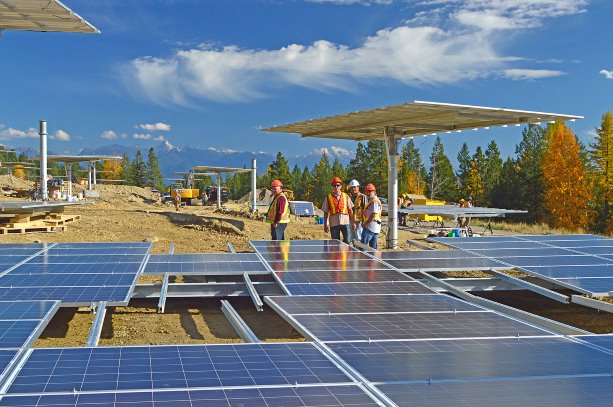Canada’s shift towards more high-performance buildings and a low carbon economy could create millions of construction jobs, a new study from the Columbia Institute shows.
The study, Jobs for Tomorrow — Canada’s Building Trades and Net Zero Emissions, co-authored by Tyee Bridge and Richard Gilbert, argues that if Canada aims to achieve net-zero by 2050, nearly 20 million jobs could be created.
This includes more than four million direct construction trades jobs. The work would come from green buildings, net-zero retrofits, district energy systems, renewable energy and transportation.
Here’s how the study broke down its estimates.
The institute anticipates that new eco-friendly construction and retrofitting could create almost two million direct non-residential construction jobs, while building small district energy systems in 50 per cent of Canada’s metropolitan areas could create more than 547,000 construction jobs.
Urban transit infrastructure, such as rapid transit lines and bridges, could yield 245,000 jobs.
Moving to an electrical supply grid composed primarily of hydroelectric (40 per cent), wind, solar, geothermal and tidal power generation (43 per cent), and legacy nuclear (five per cent) could create over 1.1 million direct construction jobs.
The study was commissioned by Canada’s Building Trades Unions to explore the role of Canada’s construction industry and the potential for low-carbon economy job growth.
"What is interesting is that as we did research we found that there were many indicators that the shift towards a low carbon economy is underway globally," said Charley Beresford, executive director of the Columbia Institute. "It is becoming less expensive to buy renewable energy products."
She explained that there are two things driving this transformation. The first is public policies around climate. For instance, last year the federal government announced the country needs to trim emissions 80 per cent below 2005 levels by 2050 in order to match the goals of the international Paris climate accord. Canada is one of 197 nations that signed on to the Paris Agreement committing to slash greenhouse gas emissions. The market is also driving this change as green technology is getting cheaper.
"The interesting thing about this is that it doesn’t really matter what kind of infrastructure it is for an economy, it is going to be built by the building trades," said Beresford. "That means that many of the jobs are immediately transferable. These are skills that people already have."
However, Beresford acknowledged that so much work has the potential to create a labour crunch.
"That’s a very nice problem to have," she said, adding it could be an opportunity to access underrepresented groups for labour, like women or indigenous people.
"Canada’s building trades’ professionals have a proud history of building the infrastructure, businesses and homes in this country," said Bob Blakely, Canadian operating officer for Canada’s Building Trades Unions, in a press release. "And, as we mark this milestone anniversary, this study shows the important and continuing role for our members as we transition to a low-carbon economy."
He continued, "This neither means nor implies the sudden end of the use of fossil fuels, but it does mean a shift in how fossil fuels are used and in what quantities."











Recent Comments
comments for this post are closed